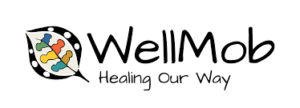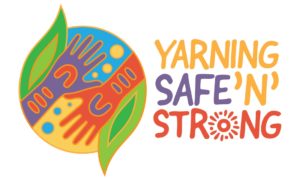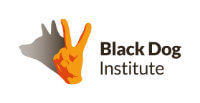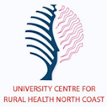Sign up below to receive monthly eMHPrac newsletters and updates about the latest digital mental health news, events, and resources.
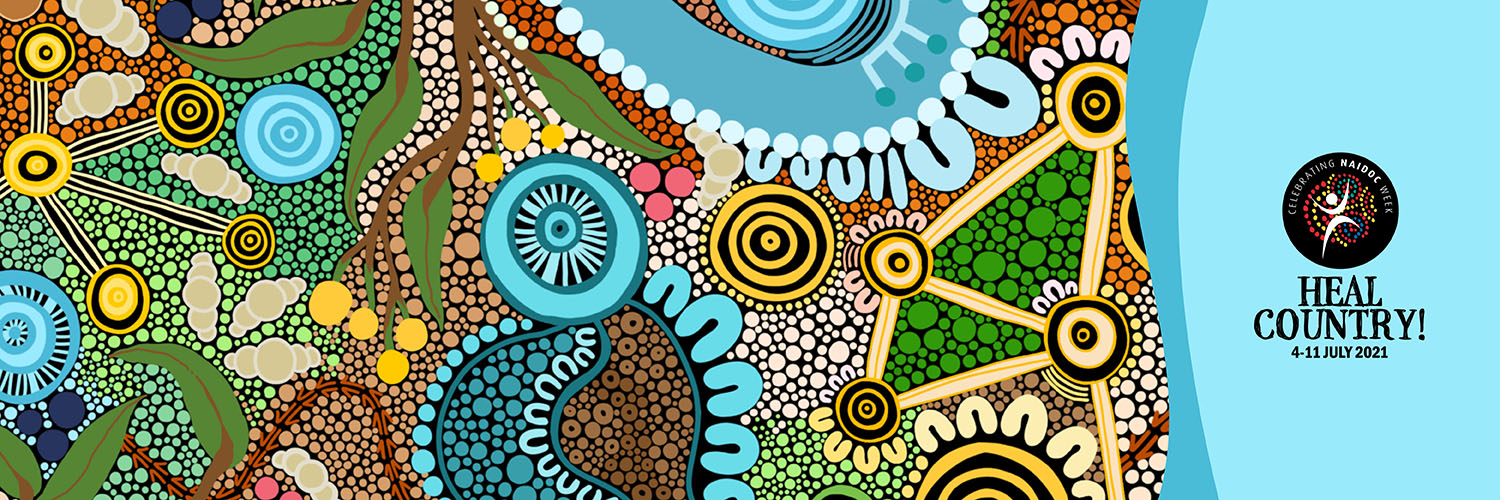
Welcome to the July 2021 edition of the eMHPrac newsletter. This July we’ve been celebrating NAIDOC week, honouring the history, culture and achievements of Aboriginal and Torres Strait Islander peoples. The eMHPrac Team acknowledges the Traditional Custodians of the land on which we live and work, and pays respect to elders past, present and emerging and the continuation of cultural, spiritual and educational practices of Aboriginal and Torres Strait Islander peoples.
In this edition, we highlight some fantastic digital mental health resources to support Aboriginal and Torres Strait Islander social and emotional wellbeing.
In this edition
- Social and emotional wellbeing resources for Aboriginal and Torres Strait Islanders
- Latest eMHPrac digital mental health guides and factsheets
- Latest eMHPrac Podcast – Episode 3 with Professor Nick Titov
- Upcoming webinar – Loneliness and the Impact of Mental Health of the Older Person | July 20
- See the eMHPrac team at these upcoming conferences
- Read the latest dMH research articles
- This month’s featured service: iBobbly
Social and emotional wellbeing resources for Aboriginal and Torres Strait Islanders

This NAIDOC week, we celebrate the growing range of social and emotional wellbeing resources for Aboriginal and Torres Strait Islanders. Check them out below!
WellMob
WellMob is a website that brings together online, culturally relevant wellbeing resources for Aboriginal and Torres Strait Islanders.
The WellMob website includes a range of resources including apps, websites, audio, documents, social media, and videos organised under 6 categories: Mind, Body, Our Mob, Culture, Keeping Safe, and Healing.
Stay Strong App
*Recently updated!*
A motivational care planning app that helps health professionals provide brief intervention to Aboriginal clients by considering their social supports, strengths, worries, and the goals or changes they would like to make.
It is designed for use by Aboriginal Health Workers, nurses, GPs, allied health professionals, and others and can be used in clinical and community settings.
Yarning SafeNStrong
A national 24/7 helpline with culturally suitable counsellors you can yarn safely with ‘who get it’, no matter how big or small the challenge.
iBobbly
A social and emotional wellbeing self-help app for young Aboriginal and Torres Strait Islander peoples aged 15 years and over.
Check out eMHPrac’s wide range of digital mental health guides and brochures!
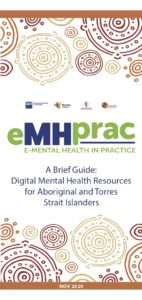
The eMHPrac team has a growing library of guides, brochures, factsheets, and other resources to help health practitioners select suitable digital mental health resources for clients (or to hand out to clients for self-help).
One of eMHPrac’s most popular resources is the Brief Guide to Digital Mental Health Resources for Aboriginal and Torres Strait Islanders, pictured above. This resource is extremely useful in health clinics, hospitals, schools, community services and other places where it can be used as a quick referral source. Order hard copies here or view the brochure below.
View the Aboriginal and Torres Strait Islander brochure here!
Check out some of our other recently released guides and factsheets:
Did you catch the latest episode of the eMHPrac Podcast?
Ep.3 – In Conversation with Professor Nick Titov: Digital Mental Health in Australian Healthcare System
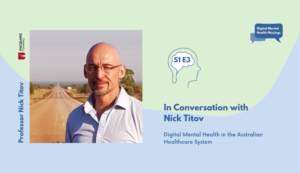
In Episode 3 we speak to Professor Nick Titov about his work in digital mental health and digital mental health in the Australian Healthcare system.
Nick Titov is a Professor in the Department of Psychology, Macquarie University. His work focuses on the development and delivery of digital psychological treatments. He has been involved in more than 90 clinical trials of psychological interventions involving more than 10,000 people across four countries. He has published more than 200 peer-reviewed papers.
Nick is also Executive Director of both the MindSpot and PORTS’ Clinics. MindSpot is an Australian national service that provides digital assessment and treatment for adults with anxiety and depression. PORTS delivers digital mental health services to primary care across the state of WA. Together, these clinics employ more than 60 mental health professionals and serve more than 30,000 people per year. His research and clinical services have attracted more than $80M in funding.
You can also access Digital Mental Health Musings on Soundcloud, Apple Podcasts, Spotify, Google Podcasts, Amazon Music, and Deezer.
Upcoming Live Webinar
Webinar 49 | Loneliness and the Impact of Mental Health of the Other Person
Tues 20th July 1:00pm (Australia/Sydney)
Tues 20th July 8:00pm (Australia/Sydney)
This webinar, hosted by Black Dog Institute, will explore how GPs, Psychologists and other Allied Health Professionals can identify loneliness in older patient, and utilise resources to reduce the impact of loneliness on older patient’s mental health.
Learning Objectives:
- Understand the impact of loneliness on the mental health of older people.
- Describe the impact of depression and dementia on the older people in the context of loneliness.
- Identify therapeutic supports that can be utilised with other patients experiencing the effects of loneliness.
- Identify eMental health resources that can be used with older patients.
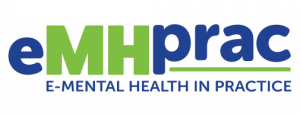
Catch us at these upcoming conferences
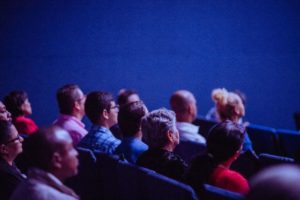
International Mental Health Conference
RACV Royal Pines Resort, Gold Coast (Postponed)
Unfortunately, due to COVID-19, this conference has now been postponed. Keep an eye on the website for confirmation of a new date.
National Allied Health Conference
9-12 August 2021, Virtual
The 14th National Allied Health Conference, to be held ONLINE for the first time, will provide the opportunity to explore and discuss the many factors that contribute to the overall success of Allied Health in Australia. There will be an exciting program of speakers, workshops, virtual exhibitors, and lots of networking opportunities.
The eMHPrac team will be recording a 5-minute ‘Lighting Oral’ presentation, entitles ‘Bridging the Divide Between Practitioner and Consumer Use of Digital Mental Health’.
The presentation will be available one week prior to the conference (from Tues 3 August) to 3 months post-conference, at the following link:
CLICK HERE TO VIEW THE LIGHTNING TALK PROGRAM
To register for the conference or view the program, click the link below.
Workplace Mental Health Symposium
13-15 September 2021, JW Marriot Gold Coast Resort & Spa
‘Improve & Promote Workplace Mental Health and Wellbeing’
Changing work environments, rising uncertainty, and increased social isolation are just some of the factors that contribute to mental ill-health. With 30% of Australians already reporting moderate to high levels of stress – and numbers expected to rise – workplaces have a responsibility to help flatten the curve.
The symposium will provide the latest tools and knowledge to improve mental health and wellbeing in your organisation.
To register for the conference or view the program, click the link below.
Care Expo
17-18 September 2021, Brisbane Convention & Exhibition Centre
‘Disability support | Aged care | Mental wellness’
The 2021 Care Expo Brisbane brings together a diverse range of community services, businesses and organisation from the support, health and care industries. Discover and connect with providers from aged care, disability and in-home support through to education, mobility, mental health, social, recreational services and more. The 2o21 Care Expo Brisbane will also feature a range of inspirational and educational speakers.
Registration is FREE. To register for the expo or learn more, click the link below.
On our reading radar…
A cluster randomised controlled trial of a web-based youth mental health service in Australian schools
Bridianne O’Dea, Mirjana Subotic-Kerry, Catherine King, Andrew J. Mackinnon, Melinda R. Achilles, Melissa Anderson, Belinda Parker, Aliza Werner-Seidler, Michelle Torok, Nicole Cockayne, Simon T.E. Baker, Helen Christensen. A cluster randomised controlled trial of a web-based youth mental health service in Australian schools. The Lancet Regional Health – Western Pacific, Volume 12, 2021, 100178, ISSN 2666-606. https://doi.org/10.1016/j.lanwpc.2021.100178.
“This trial evaluated the effectiveness of universal web-based service (Smooth Sailing) for improving help-seeking intentions for mental health problems and other related outcomes among students.
A cluster randomised controlled trial was conducted to evaluate the 12-week outcomes of the Smooth Sailing service among 1841 students from 22 secondary schools in New South Wales, Australia.
…At 12-weeks post-baseline, there was a marginal statistical difference in the relative means of help-seeking intentions (effect size=0.10, 95%CI: -0.02–0.21) that favoured the intervention condition. Help-seeking from adults declined in both conditions. There was a greater reduction in the number of students who “needed support for their mental health but were not seeking help” in the intervention condition (OR: 2.08, 95%CI: 1.72–2.27, P<.0001). No other universal effects were found. Participants found the service easy to use and understand; However, low motivation, time, forgetfulness, and lack of perceived need were barriers to use.
Smooth Sailing led to small improvements in help-seeking intentions. Refinements are needed to improve its effectiveness on other mental health outcomes and to increase student uptake and engagement.”
Trajectories of Change in an Open-access Internet-Based Cognitive Behaviour Program for Childhood and Adolescent Anxiety: Open Trial
March S, Batterham P, Rowe A, Donovan C, Calear A, Spence S. Trajectories of Change in an Open-access Internet-Based Cognitive Behavior Program for Childhood and Adolescent Anxiety: Open Trial. JMIR Ment Health 2021;8(6):e27981. URL: https://mental.jmir.org/2021/6/e27981. DOI: 10.2196/27981
“Although evidence bolstering the efficacy of internet-based cognitive behavioral therapy (iCBT) for treating childhood anxiety has been growing continuously, there is scant empirical research investigating the timing of benefits made in iCBT programs (eg, early or delayed).
…This study’s participants included 10,366 Australian youth aged 7 to 17 years (4140 children aged 7-12 years; 6226 adolescents aged 12-17 years) with elevated anxiety who registered for the BRAVE Self-Help program.
…The results show that young people completing the BRAVE Self-Help program tend to fall into two trajectory classes that can be reliably identified in terms of high versus moderate baseline levels of anxiety and subsequent reduction in symptoms. Both high and moderate anxiety severity trajectory classes showed significant reductions in anxiety, with the greatest level of change being achieved within the first six sessions for both classes. However, those in the moderate anxiety severity class tended to show reductions in anxiety symptoms to levels below the elevated range, whereas those in the high symptom group tended to remain in the elevated range despite improvements.
These findings suggest that those in the high severity group who do not respond well to iCBT on a self-help basis may benefit from the additional support provided alongside the program or a stepped-care approach where progress is monitored and support can be provided as necessary.”
This edition’s featured service…
iBobbly
iBobbly is a social and emotional wellbeing self-help app for young Aboriginal and Torres Strait Islander peoples aged 15 years and over.
About iBobbly
iBobbly is a social and emotional wellbeing self-help app for young Aboriginal and Torres Strait Islander peoples aged 15 years and over.
Completely private and confidential, it helps by showing you ways to manage your thoughts and feelings, as well as how to decide what is important in your life.
Importantly, everything that is seen, heard and experienced in the app is shaped by Aboriginal and Torres Strait Islander community members to ensure that iBobbly is culturally informed and safe.
iBobbly has four main features:
- How do I feel – walks you through a self-assessment and gives you feedback about how you are going. Allows you to keep a mood diary to see how you are tracking.
- Stuff I can use – teaches you how to manage your thoughts and feelings, including any suicidal thoughts. This section also helps you to identify the characteristics you want to stand for and encourages you to set realistic, positive goals.
- How I’m gonna beat this – helps you create your own personalised action plan and gives you the tools to monitor your progress.
- Help – provide you with help and support options.
Who is iBobbly for?
iBobbly is specifically designed for Aboriginal and Torres Strait Islander peoples who:
- are aged 15 years and older
- are feeling sad and down
- might be having thoughts of hurting yourself
- have access to a Smart phone or Tablet/iPad and data for downloading
Is there a cost to use iBobbly?
No – iBobbly is completely free to download.
How to access iBobbly
iBobbly can be downloaded from the iTunes App Store (IOS) or on Google Play (Android).
To be able to register you must fill in your first time, year of birth, email address or mobile number, and postcode (so a list of local health services can be provided). Users also have the option to provide the details of a close support person.
Practitioners may register to use the program if they wish.

